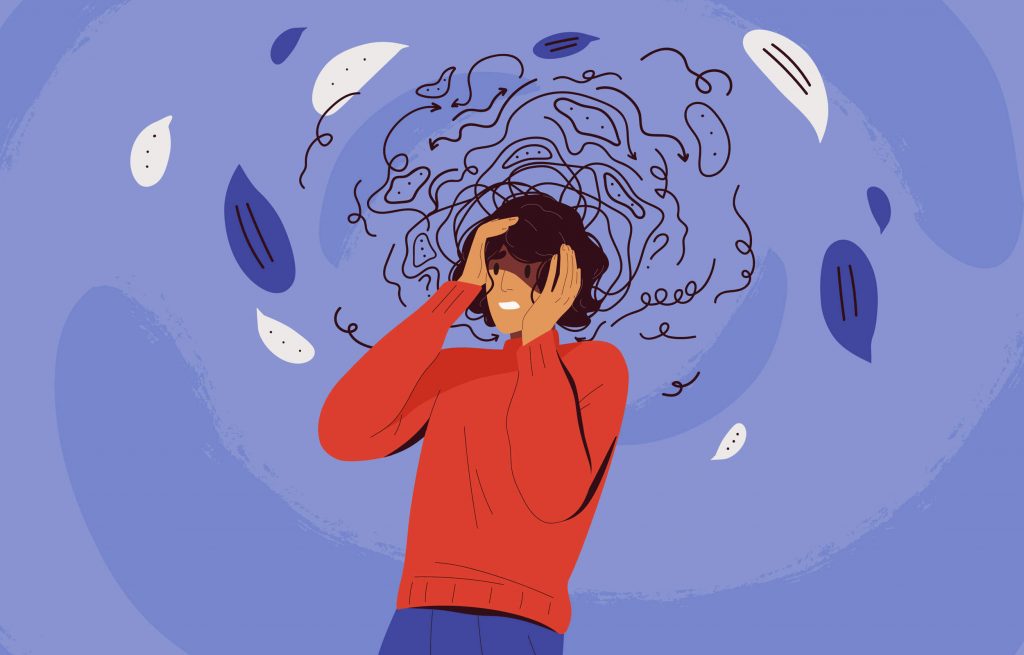
Awareness of mental health disorders has improved greatly over the past few years, but there is still quite a long way to go. Although 1 in 6 people in California suffer from a mental health problem, only around a third of sufferers get the help that they need. One mental health disorder that is still being undertreated in the Californian population is anxiety.
Experiencing anxiety from time to time is very normal. Everyone will occasionally feel anxious, whether about an upcoming job interview, a dental appointment, or an exam. However, if you have an anxiety disorder, you suffer from persistent, excessive and intense fear and worry about situations that you encounter on a daily basis.
One problem that often arises is that many people with anxiety disorders fail to recognize that they have a problem. Because anxiety is something that everyone experiences it can be hard to acknowledge that you’re feeling it more often than most people. Yet, if those feelings of panic and anxiety interfere regularly with your daily activities, have become hard to control and are entirely out of proportion to the situation in question, you should seek help.
The key is to be aware of the signs of increased anxiety so that you can spot them whenever they arise. This allows you to monitor them carefully and take action before the problem gets out of hand.
What Types Of Anxiety Disorder Exist?
There are many different types of anxiety disorder. These include:
- Agoraphobia – this anxiety disorder causes sufferers to fear situations or places that cause panic and make them feel embarrassed, helpless or trapped. They then start to avoid those situations and places.
- GAD (Generalized Anxiety Disorder) – a survey in July 2020 revealed that a shocking 44% of adults in California showed signs of generalized anxiety disorder. This condition involves excessive and persistent worry and anxiety about events or activities, even those that are routine. The anxiety is well out of proportion to the situation itself but is hard to control and affects the sufferer in a physical way.
- Panic disorder – this involves repeating episodes of intense anxiety and terror that reach their peak in just a few minutes. These are known as panic attacks. Sufferers have a feeling of impending doom and suffer from chest pain, difficulty breathing, and heart palpitations. When someone has panic attacks, they may then start to worry more about them occurring again and starting to avoid situations in which they’ve experienced one before.
- Social phobia – also known as social anxiety disorder, this condition involves having a high level of fear and anxiety about social situations. Sufferers avoid social settings because they feel self-conscious, embarrassed and worried about being negatively viewed or judged by others.
- Phobias – specific phobias cause major anxiety. Whenever a sufferer is exposed to the specific situation or object that they are afraid of they feel extremely anxious and may experience a panic attack.
There are other forms of anxiety disorder too. For example, some people suffer from anxiety after using legal or illegal substances such as drugs or alcohol. Others have symptoms of anxiety that don’t fit into any of the above categories but that have a severe impact on their life.
What Are The Causes And Risk Factors Of Anxiety?
At the present time, it isn’t fully understood why anxiety disorders arise in certain people. Traumatic events and similar negative life experiences may trigger an anxiety disorder in anyone who is already prone to anxiety, but inherited traits may also be a contributing factor. In some people, anxiety is linked to underlying health issues. The symptoms and signs of anxiety may, in such cases, be the first indicator of a medical problem. This may be diabetes, heart disease, a thyroid problem, a respiratory disorder, IBS, chronic pain or even a rare tumor that is producing fight-or-flight hormones.
There are certain factors that increase the risk of an anxiety disorder developing. These include:
- Trauma – anyone who has endured trauma or abuse or who has witnessed a traumatic event have a greater chance of developing anxiety disorders.
- Stress – suffering from a serious illness or health condition can result in significant anxiety about the future and treatment. Meanwhile, smaller stressful situations can build up and trigger an anxiety disorder. For example, ongoing concerns about money or work.
- Personality traits – people who have specific personality types are more likely to suffer from an anxiety disorder.
- Co-occurring mental health problems – people who have mental health problems like depression may also suffer from anxiety disorders.
- Genetics – if you have a blood relative who suffers from anxiety it may run in your family.
- Alcohol or drug use – using or misusing alcohol or drugs can worsen or cause anxiety.
Knowing the risk factors and causes of anxiety is important, but it’s more important to know how to spot the signs that normal, healthy anxiety is developing into something more serious.
Here, we’ll take a look at six signs that your anxiety is increasing and is becoming a debilitating issue.
1.You’re Experiencing Physical Symptoms
Normal anxiety may make you feel as if you have butterflies in your stomach, but when your anxiety is increasing to a significant level the physical symptoms you experience will be much more prevalent. They may include excessive sweating, an upset stomach, a headache, difficulty breathing or a rapid heartbeat. If you experience stomach ache when you’re invited to social functions, if you feel as if your heart will burst because it’s beating so fast when you speak to a stranger or when you find you’re sweating through your clothes whenever you have to leave your house, even if it’s freezing outside, you could be suffering from an anxiety disorder that requires treatment. If your body is regularly reacting to stressors that you encounter every day with a fight or flight response, you’re no longer experiencing healthy levels of anxiety.
“Anxiety just seemed to creep up on me over time” Ricardo, who has recently been diagnosed with social anxiety disorder reports. “At first I thought it was normal to feel anxious, but then, when I took stock of my situation, I realised that the amount of anxiety I was feeling was crazy. At first, I would just feel anxious when I had to give a speech or speak up in a meeting at work. But eventually, I would start sweating and having chest pains just at the thought of having to contribute to a discussion with colleagues or having to shake hands with a new client.”
2.Cognitive Symptoms
Difficulty concentrating, memory issues and insomnia are signs that your anxiety levels are increasing unhealthily. If you’re struggling to get to sleep or are waking repeatedly in the night because you’re thinking about the things that are stressing you out, you could benefit from seeking help for your anxiety problem. If you’re struggling to watch a movie, read a book or focus on your work, or if you’re always forgetting things, this is also a sign that you’re way too anxious to function normally.
“It was my son who recognised that my anxiety was getting out of hand.” Said Laura, a grandmother of three who was diagnosed with GAD six months ago. “He pointed out that I didn’t seem to be able to sit still for more than a few minutes without becoming restless and agitated. I would sit down to watch a TV program and within five minutes I would find negative thoughts and worries circling round inside my head. Soon I’d be lost in my anxiety and would have to look for something to do to take my mind off it.”
3.Avoidance And Procrastination
Whether you’re putting off doing something that makes you feel anxious – for example ignoring an important letter or putting off a certain task until you feel ready to cope with it – or whether you’re avoiding pretty much everything, this is a sign that your anxiety is increasing. Everyone puts off difficult or unpleasant tasks somethings. However, if you’re spending more time putting off or avoiding tasks than doing them you need to get some help.
“My anxiety levels started increasing when I began suffering from financial problems.” Kelvin, a student who is now undergoing therapy said. “I knew at some level that my money issues weren’t going to go away but I felt so much panic every time I saw a letter arrive from the bank that I began to put off opening them so I wouldn’t feel so anxious. Eventually, I ended up with a pile of about ten letters that I hadn’t opened. In the end, I knew I had to do something but I still couldn’t bring myself to read what they said. I had to ask my mom to open them and read them for me because I couldn’t face doing it myself.”
4.Constant Worrying And Overthinking
If you find that you’re unable to function because of your worry and anxiety, or you find you’re overthinking so much you’re unable to sleep or focus on work, your anxiety levels are increasing to an abnormal level. If anxiety is taking over your life and causing disruption in your life, it’s time to get help.
“A few years ago, I was diagnosed with skin cancer.” Said Manuel, who is currently receiving treatment for health anxiety. “I was extremely worried about my diagnosis and my future as well as what the treatment would involve. However, I was lucky. The cancer was removed and I was given the all-clear. But in the years that followed, I found that I was constantly worrying about one health problem or another. I found I was constantly checking my body for unusual moles that would indicate the cancer was back. Soon, I was seeing potential symptoms of disease everywhere. It got to the point where if I even coughed I thought I was going to die.”
5.Feeling Restless And Agitated
If you’re always feeling on edge, quick to anger and can’t seem to stop moving, your anxiety levels may be getting too high. Anxiety often disguises itself as anger as anger is a way of shielding yourself from anxious thoughts. Meanwhile, if you’re constantly moving you won’t have enough time to dwell on the thoughts that make you feel worried. However, neither of these responses is helpful or healthy long-term. If you’re feeling restless and agitated most of the time and are snapping at people over little things, your anxiety levels are probably too high.
6.Panic Attacks
People often mistake panic attacks for heart attacks. If you experience a rapid heartbeat, tightness in the chest, shaking, sweating, difficulty breathing and an upset stomach, you’re probably having a panic attack. If this happens once, it isn’t too much to be concerned about. But if you’re getting panic attacks frequently you may be suffering from panic disorder.
Is My Anxiety Unhealthy Or Healthy?
If you’re unsure as to whether your anxiety is still healthy or whether it’s tipped over into unhealthy levels of anxiety you need to ask yourself whether your anxiety levels are still manageable. If you’re struggling to work, sleep, interact with other people or carry out daily tasks, your anxiety levels have probably increased to the point where you need professional help. If you’re feeling anxious for more than four days a week for more than six months of the year, you should see your doctor.
If you’re feeling increased levels of anxiety, there are several things you can do to help reduce the severity of the symptoms you experience. These include:
- Getting help as early as possible. Anxiety, just like most other mental health disorders, is harder to treat when you wait to get help.
- Staying active. If you participate regularly in activities which make you feel happy and give you enjoyment, your worries can lessen.
- Avoid using drugs and alcohol. Using these substances may seem to help but can actually worsen or cause anxiety.

Although increased anxiety is difficult to live with, it’s possible to get help in Southern California that will make you feel better and learn how to cope in the long-term. Seek support as soon as you recognize your anxiety levels are on the rise and you will be on your way to better mental health.
